GOD ANNOUNCES THE COMING DESTRUCTION OF SODOM AND GOMORRAH part 1
Up to this point, the Lord has not revealed to Abraham what He is going to do with Sodom and Gomorrah. The three men then set out on their journey, walking from Abraham’s home near Hebron toward the city of Sodom.
Abraham walks with them for a time, until they arrive at a high vantage point from which they can look across and see Sodom. From there, the Lord reveals to Abraham His plan regarding the grave sins of Sodom and Gomorrah.
The implication is that God will bring judgment on those people if their sins were as wicked as He had heard. This, of course, is a figure of speech, since God already knows exactly how sinful these cities are.
The reason for this human perspective is revealed in the conversation with Abraham, as Abraham tries to specify just “how wicked” these cities must be to earn God’s wrath.
Genesis 18:17-23 KJV
[17] And the LORD said, Shall I hide from Abraham that thing which I do;
[18] Seeing that Abraham shall surely become a great and mighty nation, and all the nations of the earth shall be blessed in him?
[19] For I know him, that he will command his children and his household after him, and they shall keep the way of the LORD, to do justice and judgment; that the LORD may bring upon Abraham that which he hath spoken of him.
[20] And the LORD said, Because the cry of Sodom and Gomorrah is great, and because their sin is very grievous;
[21] I will go down now, and see whether they have done altogether according to the cry of it, which is come unto me; and if not, I will know.
[22] And the men turned their faces from thence, and went toward Sodom: but Abraham stood yet before the LORD.
[23] And Abraham drew near, and said, Wilt thou also destroy the righteous with the wicked?
Genesis 18:17
And the LORD said, Shall I hide from Abraham that thing which I do;
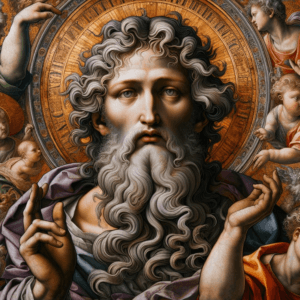 The Lord is going to destroy Sodom and Gomorrah. Notice now the reason that God is not going to hide it from Abraham. Four “men” stand looking at the city of Sodom in the distance from a high vantage point.
The Lord is going to destroy Sodom and Gomorrah. Notice now the reason that God is not going to hide it from Abraham. Four “men” stand looking at the city of Sodom in the distance from a high vantage point.
One is Abraham. One is the Lord in human form. The other two are angels, traveling companions of the Lord on this mysterious journey. By this time, Sodom has already gained a reputation for wickedness (Genesis 13:13).
This verse is another example of God using human actions, words, or speech to help us understand an idea. God called out to Adam in the garden, even though He knew where he was hiding (Genesis 3:9).
God speaks as a man to Abraham, even though He already knows how the conversation will proceed (Genesis 18:1–3). Here, God poses a rhetorical question which helps explain why, exactly, God is going through this process of appearing to Abraham and discussing Sodom.
In short, God plans to make Abraham aware so he will be all the more convinced of God’s power and sovereignty. This patient process will also emphasize the extent to which Sodom had fallen.
Genesis 18:18
Seeing that Abraham shall surely become a great and mighty nation, and all the nations of the earth shall be blessed in him?
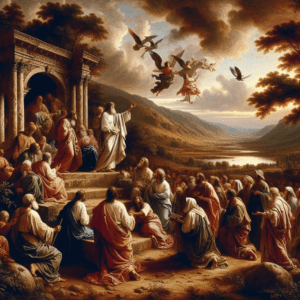 Abraham is going to have a tremendous influence. He is going to influence multitudes of people, including the succeeding generations. That is true right now today. As you read this information, Abraham is influencing us—we cannot avoid it.
Abraham is going to have a tremendous influence. He is going to influence multitudes of people, including the succeeding generations. That is true right now today. As you read this information, Abraham is influencing us—we cannot avoid it.
In the previous verse, the Lord, two angels, and Abraham stood looking at Sodom in the distance. God, apparently speaking to the angels, asks a rhetorical question. His statement is not a request for information; it’s meant to point out God’s purpose in this encounter.
Should God hide from Abraham what He was about to do with Sodom?
The expected answer, and the meaning of the comment, is that God has no intention of hiding His plans from Abraham.
Here, God continues to explain to the angels why He will not hide from Abraham what He is about to do. Abraham, the Lord says, will become a great and mighty nation. More, all of the nations of the earth will be blessed in Abraham.
In other words, God has already given His astounding covenant promises to Abraham, along with His plans for Abraham’s future offspring.
Why would God now withhold from Abraham information about His plans for Sodom?
This also means that God’s actions against Sodom are meant to carry a message to men like Abraham. What eventually occurs in that city will not only prove that God always makes good on His promises, it will also prove that God’s judgment on sin is unmistakable.
Genesis 18:19
For I know him, that he will command his children and his household after him, and they shall keep the way of the LORD, to do justice and judgment; that the LORD may bring upon Abraham that which he hath spoken of him.
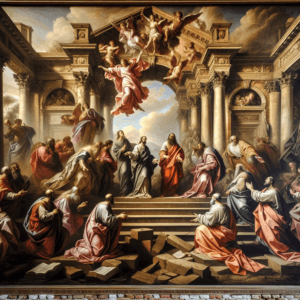 God says, “I’d better not hide it from Abraham because he will get a wrong impression of Me.” Notice by the way, that this man Abraham had discipline in his household. The Lord continues to explain why He will reveal to Abraham His plans for Sodom.
God says, “I’d better not hide it from Abraham because he will get a wrong impression of Me.” Notice by the way, that this man Abraham had discipline in his household. The Lord continues to explain why He will reveal to Abraham His plans for Sodom.
In the previous verse, the Lord repeated that Abraham would become a great and mighty nation, through his offspring, and that all of the nations of the world would be blessed through Abraham.
Now the Lord adds that He has chosen Abraham, in part, to command his children, and through them, all of the children who would follow, to keep the Lord’s way by doing what was right and just.
In that way, the Lord would keep His covenant promises to Abraham. This places an important context on God’s decision to tell Abraham, in advance, what was about to happen to Sodom.
As Abraham pleads for God to spare the innocent of Sodom—of whom there are virtually none—and sees God’s destruction, he will be reminded of the holiness to which he is being called.
This is the first mention of Abraham’s responsibility to command and train each following generation to keep the way of the Lord. By extension, this same command is applied to Israel.
This is also one of the few mentions that God’s keeping of His promises to Abraham will be tied to Israel keeping to the way of the Lord.
Genesis 18:20
And the LORD said, Because the cry of Sodom and Gomorrah is great, and because their sin is very grievous;
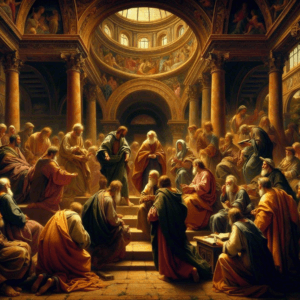 It is a good thing that God told Abraham He was going to destroy these cities, because otherwise Abraham would have gotten a wrong impression of God.
It is a good thing that God told Abraham He was going to destroy these cities, because otherwise Abraham would have gotten a wrong impression of God.
He would have thought that God was rather dictatorial and vindictive and that He was One who apparently showed no mercy for or consideration of those who were His.
Abraham would really have had a distorted and warped view of God, and so God lets him know what He is going to do.
Having explained why He will reveal His plans for Sodom to Abraham, the Lord now begins to do so. Apparently, Abraham was unable to hear the Lord’s words in the previous verses. Now the Lord speaks directly to him.
What the Lord says is ominous. The outcry against the peoples of the cities of Sodom and Gomorrah is great, and their sin is grave. The language used is similar to what God said to Cain in Genesis 4:10, “Your brother’s blood cries out to me from the ground.”
In the same poetic sense, the cries of the victims of the sins of Sodom and Gomorrah had reached the ears of God Himself. He was about to execute justice.
God’s reason for revealing this to Abraham, in advance, seems to have several layers. First, since Abraham is meant to be the founder of God’s chosen people, he needs to see that God’s promises—all of His promises—are kept.
This not only means the covenant with Abraham, but God’s judgment of sin and wickedness. Also, the opportunity for Abraham to plead for the innocent of Sodom, of whom there are virtually none, highlights for Abraham just how depraved that culture had become.
These combine to highlight God’s perfect justice, which is something He wants His chosen people to understand.
Genesis 18:21
I will go down now, and see whether they have done altogether according to the cry of it, which is come unto me; and if not, I will know.
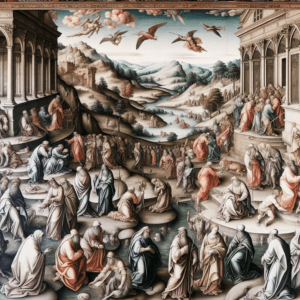 In other words, God is saying to Abraham, “I know the situation there, but I’m going down to investigate.” God never does anything hurriedly or hastily.
In other words, God is saying to Abraham, “I know the situation there, but I’m going down to investigate.” God never does anything hurriedly or hastily.
Abraham now has time to turn this over in his mind. It is also a good thing that God told him because he did have a wrong idea of God and of Sodom and Gomorrah—he was wrong about many things.
This is one of the reasons that God is telling us as much as He is. There are a lot of things that He does not tell us, but He has told us enough so that though a man be a fool and a wayfaring man, he needn’t err therein.
The Lord continues explaining to Abraham His plans for Sodom and Gomorrah. In the previous verse, God states that outcry over the sins of those cities had reached His ears.
Now the Lord says that He intends to go down to the cities to see for Himself if such an outcry is justified. Both of these are examples of God using human terminology to more clearly explain His message.
The Lord already knows exactly what sins have occurred. He intends to visit the cities to make the case for executing His judgment on them, much as a parent who already knows exactly what a child has done says they are going to “go look” at the situation.
In the following verses, we will see Abraham’s great concern for his nephew Lot, who lives in Sodom and is in great danger of being swept away with the wicked people of the city.
Genesis 18:22
And the men turned their faces from thence, and went toward Sodom: but Abraham stood yet before the LORD.
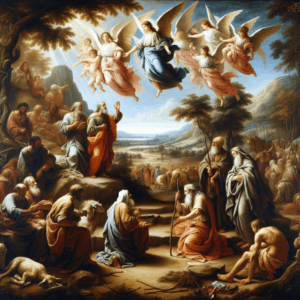 Abraham is now waiting before the Lord. In the previous verses, the Lord in human form had revealed to Abraham His plans for the cities of Sodom and Gomorrah.
Abraham is now waiting before the Lord. In the previous verses, the Lord in human form had revealed to Abraham His plans for the cities of Sodom and Gomorrah.
As they stood at a high vantage point overlooking Sodom in the distance, with two angels standing nearby, the Lord told Abraham that the sin of the people of those cities was very great. The outcry of their victims had reached His ears.
The Lord was preparing to go and see the city for Himself to confirm what He had heard and, by implication, proceed with executing His judgment against it. All of these are stated in human terms, in order to highlight God’s point.
Like a parent who already knows what has happened, God asks rhetorical questions and speaks of “investigation” for the sake of His children.
Now the two angels turn and walk toward Sodom. Abraham and the Lord remain where they are. Abraham’s nephew Lot lives in the city, and Abraham is about to question the Lord more specifically about Sodom’s future.
The answers he receives will not be pleasant.
Genesis 18:23
And Abraham drew near, and said, Wilt thou also destroy the righteous with the wicked?
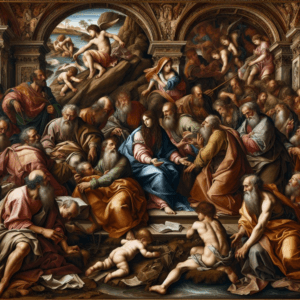 What is the first thing that enters Abraham’s mind?
What is the first thing that enters Abraham’s mind?
The first thing that enters his mind, of course, is Lot. He had rescued Lot once, and now Lot is again in danger down there.
I think that Abraham had wondered many times about Lot and his relationship to God, but at least he believes that Lot is a saved man.
He is asking God, “What about the righteous?” I believe that Abraham would have told you that he thought there were many people in the city of Sodom who were saved.
He could not understand why God would destroy the righteous with the wicked. What a picture we have here!
The Lord has revealed to Abraham His plans to investigate the sinfulness of the cities of Sodom and Gomorrah and, by implication, execute judgment upon them if they are guilty.
This is entirely for man’s benefit, since God already knows what is happening. Rather, by speaking of “investigation,” and conversing with Abraham, God is teaching mankind by giving us a clear, unmistakable justification for what He is about to do.
Abraham certainly knew of the wickedness of these cities (Genesis 13:13; Genesis 14:22–23). Not only would they have had a reputation in the region for their behavior, but Abraham’s nephew Lot and his family also live in the city, among the people.
Abraham is concerned that Lot will suffer the same fate as the rest of the city if the Lord chooses to take action against them. This seems to be his motivation for asking God to spare the city.
Abraham begins to question the Lord about what will happen.
Will He “sweep away the righteous with the wicked?”
In other words, will God allow innocent people to be hurt in His judgment of the guilty?
This is a question many still ask about the Lord. Is He just?
What are the boundaries of His mercy?
What will keep Him from delivering His righteous wrath on those who are guilty of grave sins?
As human beings, we recoil at the idea of those we perceive as “innocent” being caught up in God’s wrath against those we perceive as “guilty.” The following verses will reveal that Abraham desperately wants for the Lord to quantify His mercy with a specific number.

GOD ANNOUNCES THE COMING DESTRUCTION OF SODOM AND GOMORRAH part 2
As the two angels walk on toward the city, Abraham begins a kind of negotiation with the Lord. His nephew Lot and his family live in Sodom. Abraham seems to be concerned for them.
He boldly challenges the Lord: Will you sweep away the righteous with the wicked? Abraham insists that such an action would not be consistent with the Lord’s character.
The Lord is patient with Abraham as he begins to ask for assurances. Will you destroy the city if you find 50 righteous people there? The Lord agrees that He will not.
Abraham keeps asking though, lowering the number at which the Lord would willingly destroy righteous people to judge the wicked. 45? 40? 30? 20?
Finally, Abraham asks, with a request that the Lord not be angry, if He would spare the city for the sake of 10 righteous people. Once more, the Lord agrees that He would do so if He finds that many.
With that, the Lord heads toward the city, and Abraham walks back home.
Genesis 18:24-33 KJV
[24] Peradventure there be fifty righteous within the city: wilt thou also destroy and not spare the place for the fifty righteous that are therein?
[25] That be far from thee to do after this manner, to slay the righteous with the wicked: and that the righteous should be as the wicked, that be far from thee: Shall not the Judge of all the earth do right?
[26] And the LORD said, If I find in Sodom fifty righteous within the city, then I will spare all the place for their sakes.
[27] And Abraham answered and said, Behold now, I have taken upon me to speak unto the Lord, which am but dust and ashes:
[28] Peradventure there shall lack five of the fifty righteous: wilt thou destroy all the city for lack of five? And he said, If I find there forty and five, I will not destroy it.
[29] And he spake unto him yet again, and said, Peradventure there shall be forty found there. And he said, I will not do it for forty’s sake.
[30] And he said unto him, Oh let not the Lord be angry, and I will speak: Peradventure there shall thirty be found there. And he said, I will not do it, if I find thirty there.
[31] And he said, Behold now, I have taken upon me to speak unto the Lord: Peradventure there shall be twenty found there. And he said, I will not destroy it for twenty’s sake.
[32] And he said, Oh let not the Lord be angry, and I will speak yet but this once: Peradventure ten shall be found there. And he said, I will not destroy it for ten’s sake.
[33] And the LORD went his way, as soon as he had left communing with Abraham: and Abraham returned unto his place.
Genesis 18:24
Peradventure there be fifty righteous within the city: wilt thou also destroy and not spare the place for the fifty righteous that are therein?
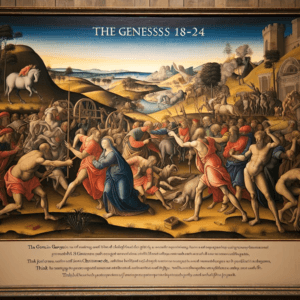 Abraham begins with fifty. He says to the Lord, “Lord, suppose there are fifty righteous down there in Sodom.
Abraham begins with fifty. He says to the Lord, “Lord, suppose there are fifty righteous down there in Sodom.
Would You destroy the city if there were fifty righteous?”
The Lord has revealed to Abraham his plan to investigate and, by implication, bring judgment on the cities of Sodom and Gomorrah for their great sinfulness.
This is a poetic device on God’s part, meant to highlight His just handling of the situation.
God already knows everything He needs to know about Sodom, so His words here are for the sake of our understanding.
Abraham, standing with the Lord as two angels walk toward Sodom, is asking the Lord some hard questions.
Abraham’s nephew Lot lives in Sodom. In the previous verse, Abraham asked God if He would bring destruction on the righteous with the wicked in His judgment.
Now Abraham gets more specific.
What if 50 righteous people lived in Sodom?
Would God not spare the place for the sake of those 50 people?
This is a question we often struggle with today: when, and why, does God allow those we perceive as “innocent” to suffer for the actions of those who we perceive as “guilty?”
Abraham is asking a bold question of the Lord who has blessed him. He’s not done, yet.
Genesis 18:25
That be far from thee to do after this manner, to slay the righteous with the wicked: and that the righteous should be as the wicked, that be far from thee: Shall not the Judge of all the earth do right?
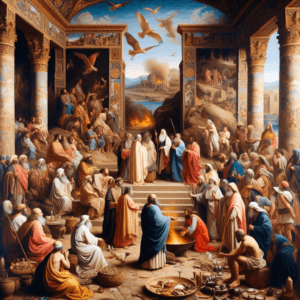 That is still a question that many people ask: “Shall not the Judge of all the earth do right?”
That is still a question that many people ask: “Shall not the Judge of all the earth do right?”
And there is an answer to it. The rest of the Bible testifies to the fact that the Judge of all the earth always does right.
Whatever God does is right, and if you don’t think He is right, the trouble is not with God, but the trouble is with you and your thinking.
You are thinking wrong; you do not have all the facts; you do not know all of the details.
If you did, you would know that the Judge of all the earth does right. We are wrong; He is right.
The Lord has revealed to Abraham His plan to investigate and, by implication, bring judgment on the cities of Sodom and Gomorrah for their great sinfulness.
Abraham, standing with the Lord as two angels walk toward Sodom, is asking the Lord some hard questions.
Abraham’s nephew Lot lives in Sodom, so Abraham seems to be angling for the city to be spared on Lot’s account.
Abraham’s question is similar to one we grapple with, even today.
Will God really bring judgment that affects righteous people, as well as wicked people?
Is there some proportion of good-to-bad that would stop God from doing so?
Specifically, Abraham asked, will the Lord sweep away the righteous with the wicked?
Would He not spare the city for the sake of, say, 50 righteous people?
Here in this verse, Abraham almost sounds indignant, possibly even manipulative.
The very idea that the Lord would kill righteous people along with those who deserve to be punished does not fit with Abraham’s idea of who God is.
He twice repeats the phrase “Far be it from you!” Then he states his central argument point: Shouldn’t the judge of all of the earth do what is just?
That is a question many people have asked of God down through the ages.
In fact, it’s the first question many people ask about the idea of an all-knowing, all-powerful, all-loving God.
Is he fair?
The problem, of course, is that when we ask the question, we ask in the way Abraham does here.
We assume, in advance, that we—not God—can define justice and righteousness, and criticize God when He does not meet our expectations.
The following verses will reveal that Abraham is both underestimating God’s justice and mercy and overestimating the goodness of humanity.
God will graciously allow Abraham to “negotiate” Sodom’s rescue to the presence of only ten righteous people—a standard the city will still fail.
Genesis 18:26
And the LORD said, If I find in Sodom fifty righteous within the city, then I will spare all the place for their sakes.
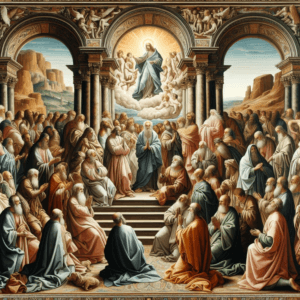 And Abraham thinks this over. Abraham’s tone in the previous verses seems indignant, and even scheming.
And Abraham thinks this over. Abraham’s tone in the previous verses seems indignant, and even scheming.
God is discussing the sins of Sodom and Gomorrah, implying that judgment was coming on those cities for their outrageous depravity.
Abraham’s nephew Lot lived in Sodom. Abraham pointedly asked the Lord if He would sweep the righteous away with the wicked.
What if 50 righteous people lived in Sodom?
Would God still destroy the city?
Abraham made it personal: Far be it from you! Shouldn’t the judge of all the world be fair?
This, of course, implies that Abraham has the right to judge God’s character according to his own perspective.
How would God respond to such a comment from a limited, sinful mortal?
Knowing nothing else about God, or the Scriptures, one would half-expect God to crush Abraham for being so insolent about His character.
Instead, the Lord responds in the most gracious way we could imagine. He simply agrees: If I find 50 righteous people, I will spare the whole place.
This, as with His prior comments about “investigating” the cities, are merely for our benefit. God does not need our approval or our understanding.
And yet, in this incident, He gently allows us to see that His decision, in this case, is entirely just.
The following verses will reveal, though, that Abraham’s not done. He’s up to something, most likely related to his concerns for his nephew, Lot.
Genesis 18:27
And Abraham answered and said, Behold now, I have taken upon me to speak unto the Lord, which am but dust and ashes:
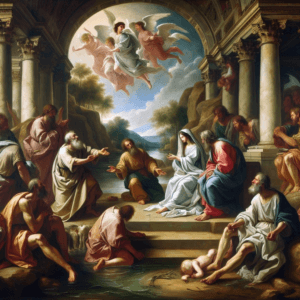 In the prior verses, Abraham brazenly questioned if God’s judgment on Sodom would be fair, since it might mean harming righteous people along with wicked people.
In the prior verses, Abraham brazenly questioned if God’s judgment on Sodom would be fair, since it might mean harming righteous people along with wicked people.
In this verse, Abraham seems to have a moment of clarity, and checks himself. Abraham acknowledges to the Lord that he is being very bold even in speaking to Him.
After all, Abraham is a mere man. He calls himself “dust and ashes.” He recognizes, apparently, that he has no right to demand anything from God.
This is a key part of our perspective on God and His actions.
God most certainly does what is good, fair, and just—and for that reason, human beings who are limited have no right to assume He is being unfair or unjust simply because we don’t like His decisions.
God’s conversation with Abraham, regarding the people of Sodom, is meant to clarify this very idea. Abraham worries that God might do something unfair.
God’s response proves that His planned action against Sodom and Gomorrah is perfectly, absolutely justified.
Abraham’s moment of humility will not prevent him, however, from continuing to push the Lord for assurances that He will spare the city of Sodom for the sake of any righteous people who live there.
This almost certainly is Abraham’s attempt to keep his nephew Lot, who lives in Sodom, from being destroyed.
Genesis 18:28
Peradventure there shall lack five of the fifty righteous: wilt thou destroy all the city for lack of five? And he said, If I find there forty and five, I will not destroy it.
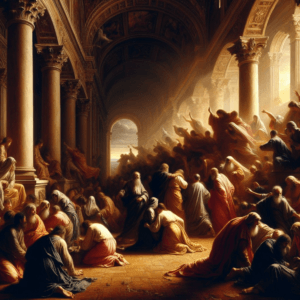 In other words, Abraham says, “If there are forty-five righteous left, would You destroy the city for forty-five?” And God tells him, “If I find there forty and five, I will not destroy it.”
In other words, Abraham says, “If there are forty-five righteous left, would You destroy the city for forty-five?” And God tells him, “If I find there forty and five, I will not destroy it.”
Abraham begins bargaining with the Lord in earnest now.
In the previous verses, Abraham declared that the Lord could not, in good character, sweep away the city of Sodom if some of the residents were righteous.
We know Abraham’s nephew Lot lived in the city (Genesis 14:12).
Abraham started by asking, what if 50 righteous people live in the city?
The Lord stated flatly that He would not destroy the city if He found 50 righteous people.
This “negotiation,” of course, is merely for the benefit of Abraham and the rest of mankind.
God has no obligation to discuss this decision with anyone. However, like a patient teacher, God allows Abraham to “talk out” the situation.
When all is said and done, this will only go to prove how truly justified God’s wrath against Sodom truly is.
After getting a positive answer from God about sparing the city for the sake of a few people, Abraham continues to work a strategy to talk the Lord down to the smallest number of people possible.
Here the Lord agrees not to destroy the city if He finds 45 righteous people. Abraham’s intent, most likely, is to plead for the rescue of his nephew, Lot, who lives in Sodom.
It’s important to note here that the word “righteous,” as used by Abraham, does not mean sinlessly perfect people.
In an Old Testament context, this term refers to those who don’t participate in the grave sins openly practiced in Sodom and Gomorrah.
Those sins included rape, sexual immorality including homosexuality, gluttony, and not caring for or helping the poor (Genesis 19; Ezekiel 16:49–50).
Genesis 18:29
And he spake unto him yet again, and said, Peradventure there shall be forty found there. And he said, I will not do it for forty’s sake.
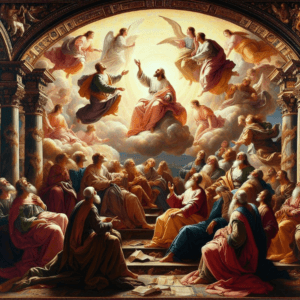 This makes the man a little bit bolder, and he says to the Lord, “Suppose there are forty?”
This makes the man a little bit bolder, and he says to the Lord, “Suppose there are forty?”
The very interesting thing is that God says, “I will not destroy it for forty” And Abraham keeps on bringing the number down.
Thanks to God’s gracious responses, Abraham seems to think he is negotiating with the Lord to spare Sodom.
This is probably an attempt by Abraham to spare the life of his nephew, Lot, and Lot’s family.
The Lord has revealed that He will investigate the sins of Sodom and Gomorrah and, by implication, bring judgment upon those cities.
This is not actually a negotiation, of course.
Like a teacher who allows a student to “talk out” a problem, God is allowing Abraham to set an incredibly weak standard for the city of Sodom—one which will still prove more than it can live up to.
Abraham started by asking if God would spare the city if He found 50 righteous people there.
The Lord agreed. Then Abraham said, “What about 45?”
The Lord agreed. Now Abraham goes to 40. Again, the Lord agrees.
The countdown continues in the following verses.
Genesis 18:30
And he said unto him, Oh let not the Lord be angry, and I will speak: Peradventure there shall thirty be found there. And he said, I will not do it, if I find thirty there.
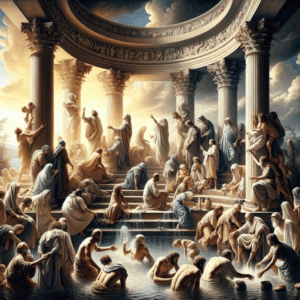 He says, “How about thirty?”
He says, “How about thirty?”
God says, “If there are thirty there, I still won’t do it.”
Abraham has boldly questioned whether God’s plan to destroy Sodom and Gomorrah is just, since there might be righteous people living there.
In this context, “righteous” does not mean moral perfection, rather it means those who did not participate in the well-known sins of the city (Ezekiel 16:49–50; Genesis 19).
God graciously allows a sinful mortal like Abraham to discuss the boundaries of His mercy, even as Abraham attempts to push God’s standards further and further down.
Here, Abraham begs the Lord not to get angry with Him.
Reading this passage with fresh eyes—knowing nothing else about God or His character as revealed in Scripture—one is likely to be concerned about Abraham’s boldness, as well.
Prior to this conversation, God destroyed virtually the entire race of man with a flood in Genesis 7.
He has declared His intent to judge the sins of Sodom and Gomorrah (Genesis 18:17–21).
We know how highly God values human righteousness, and we know what He is capable of when human beings indulge in wickedness.
Abraham, however, believes himself to be bargaining for the very life of his nephew Lot and his family.
If he can get God to agree to spare the city for the sake of the right number of righteous people, perhaps Lot can be saved from God’s judgment.
The Lord has already agreed not to destroy the city if He finds 50, 45, or 40 righteous people there.
Now the Lord agrees to 30.
Abraham, though, clearly knows how depraved this city is (Genesis 13:13; Genesis 14:22–23).
He understands that 30 might still be more “righteous” people than the city can offer.
Genesis 18:31
And he said, Behold now, I have taken upon me to speak unto the Lord: Peradventure there shall be twenty found there. And he said, I will not destroy it for twenty’s sake.
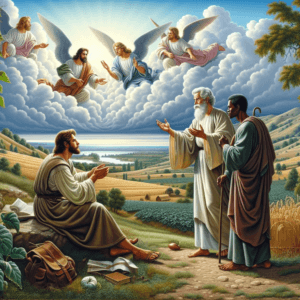 Abraham says, “Suppose there are twenty there?” God says, “I’ll not destroy it.”
Abraham says, “Suppose there are twenty there?” God says, “I’ll not destroy it.”
Abraham believes himself to be negotiating with the Lord, likely for the life of his nephew Lot and Lot’s family.
The Lord has revealed that He will investigate the sins of Sodom and Gomorrah and, by implication, bring judgment upon those cities. Lot lives in Sodom.
This is not actually a bargaining process, however. God is playing the role of a patient parent, allowing a child to “talk out” a situation for their own benefit.
Abraham is going to set the bar for righteousness in Sodom at a pathetically low level—and it still will not be enough.
The purpose of this discussion is for our understanding; while God owes us no explanation, His conversation here gives us insight which proves His actions against Sodom to be entirely justified.
Abraham started by asking if God would spare the city if He found 50 righteous people there.
The Lord agreed. Then Abraham said, “What about 45?”
The Lord agreed. Then 40. Then 30. Now Abraham asks for 20, while recognizing that he’s being incredibly bold to speak this way to God.
The Lord, again, agrees.
Genesis 18:32
And he said, Oh let not the Lord be angry, and I will speak yet but this once: Peradventure ten shall be found there. And he said, I will not destroy it for ten’s sake.
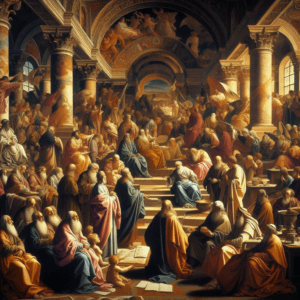 Abraham is overwhelmed now, and he takes another plunge: “Suppose there are ten righteous there.
Abraham is overwhelmed now, and he takes another plunge: “Suppose there are ten righteous there.
Would You destroy it if there are ten?”
And God says, “If there are ten righteous in the city, I will not destroy it”
After God indicates His intent to destroy Sodom and Gomorrah for their sins, Abraham tries to convince God to consider the righteous people who might live there.
In truth, God already knows that Sodom is doomed, and has no need to justify Himself to Abraham.
However, using human language, He has allowed Abraham to discuss sparing the city if a small number of people there are not involved in the city’s pervasive sins (Genesis 13:13; Ezekiel 16:49–50).
Abraham concludes his negotiation with the Lord here, with another request that the Lord not be angry with him, and a promise not to push any further after this.
If the Lord finds 10 righteous people in Sodom, will He spare the city for the sake of those 10 people?
This particular number was probably Abraham’s goal all along, with the intent of sparing his nephew, Lot, from death in the judgment against Sodom.
Once more, the Lord agrees to Abraham’s request. He will not destroy the city if 10 righteous people are found.
Of course, the Lord already knows how many righteous people He will find in Sodom and Gomorrah. He knows what’s coming.
Still, He has been gracious and kind to endure Abraham’s pointed questions and requests.
In the end, Abraham will know that the Lord is both just in His judgment and merciful in His approach.
Genesis 18:33
And the LORD went his way, as soon as he had left communing with Abraham: and Abraham returned unto his place.
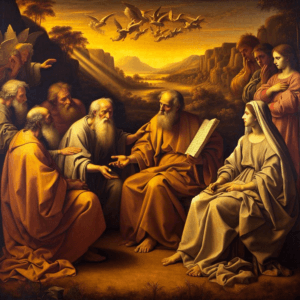 Now the question arises: Why didn’t Abraham come on down below ten?
Now the question arises: Why didn’t Abraham come on down below ten?
I’ll tell you why: At this point he is afraid that Lot is lost, and this disturbs him a great deal; so he is not going to come down any further.
But he could have come down to one. He could have said, “Lord, if there is one in that city who is righteous, would You destroy the city?”
Do you know what God would have said?
He would have said, “If there is one who is righteous in that city, I am going to get him out of that city, because I would not destroy a righteous man with the city.”
How do I know that is the way it would have been?
Because that is the way it worked out. There was one righteous man there—Abraham didn’t believe it, but God knew him—and that one was Lot.
God said to Lot, “Get out of the city. I cannot destroy it until you are out.”
Do you know that the Great Tribulation period cannot come as long as the church is in the world?
It just cannot come, my friend, because Christ bore our judgment, and the Great Tribulation is part of the judgment that is coming.
This is the reason that the church cannot go through it. This is a glorious picture of that truth.
We are going to see that Sodom and Gomorrah are a picture of the world—and what a picture!
What a condition the world is in today—it is very much like Sodom and Gomorrah.
That does not mean that the Lord is going to come tomorrow. I do not know—and no one else knows—when He will come.
But He could come tomorrow, and it certainly would be in keeping with the carrying out of the picture which is before us here in Genesis.
God has indicated that Sodom will be destroyed for its wickedness.
Abraham objects, suggesting that it would be unfair for God to punish “righteous” people along with those who are wicked, and begins to ask God to spare the city for the sake of smaller and smaller numbers of “righteous” people.
In this context, “righteous” simply means those who aren’t involved in the grievous sins of Sodom and Gomorrah (Genesis 19; Ezekiel 16:49–50).
In a display of great patience, grace, and mercy, the Lord has stood and heard everything Abraham has said to Him, including a bold claim about whether or not God’s plan is fair.
In addition, the Lord has agreed to every request from Abraham, even though Abraham turned it into what sounded like a negotiation.
Abraham’s intent all along was likely to reach the point seen in the last verse: God’s vow not to destroy the city if 10 righteous people could be found there.
The point of this is not that God needs to have His mind changed.
Rather, the purpose for this conversation is to prove, in no uncertain terms, that God’s approach to these wicked cities is entirely just.
As the Lord walks away, likely toward Sodom, and Abraham returns home, their agreement stands that the Lord will not destroy Sodom if He finds 10 righteous people there.
Abraham seems to believe, or at least hopes, that at least 10 of Sodom’s thousands of residents are not participating in the great wickedness for which they have become infamous (Genesis 13:13).
Abraham’s ultimate hope, we assume, is to save the life of his nephew Lot and his family.
Sadly, the next chapter will reveal that Abraham has overestimated the number of righteous people in Sodom.
He has also underestimated the extent of the Lord’s blessing for him and, thus, for his extended family.
God’s patient discussion with Abraham allowed Abraham to set his own standard for “goodness,” which Sodom still failed.
By any measure, the city was deserving of God’s wrath. Lot, however, will be saved from this wrath, despite his own foolishness.
I hope that you have really enjoyed this post,
Please Leave All Comments in the Comment Box Below ↓

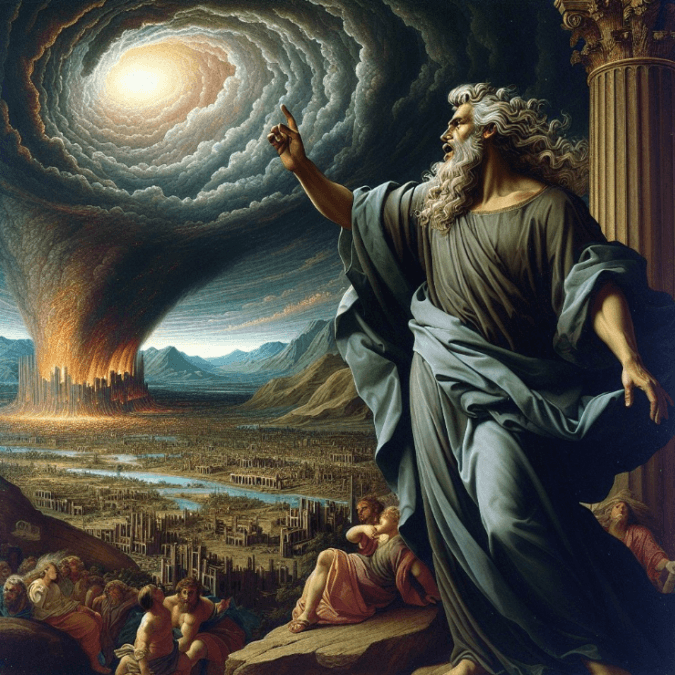











This is a very detailed description of the conversation between Abraham and God about the wickedness of the people living in Sodom and Gomorrah.
Abraham would like to see the cities saved, probably because of his family, including Lot, living there.
But God knows what is right and best. It is a good reminder of what happens to the bad people, especially in the modern times that we live in where most cities have become like a Sodom and Gomorrah.
Hello LineCowley,
I appreciate you continuing to be a beacon here on this HBS & DwJ platform.
I agree 100% with your comment, looking forward to hearing from you soon.
Blessings My Friend!
Wow, I just stumbled upon this website, and I must say, it’s a hidden gem in the vast online world!
The moment I landed here, I was captivated by the creativity and uniqueness oozing from every page. The articles are a breath of fresh air, covering such a diverse range of topics that keep me coming back for more. Each piece is a well-crafted masterpiece, combining insightful information with a sprinkle of your distinct style.
But what truly sets this website apart is its interactive nature. The comments section feels like a lively community, where people engage in thoughtful discussions and share their perspectives. It’s fantastic to see such a vibrant and respectful online space where people can connect and learn from one another.
Furthermore, the design and layout of the website are exceptionally well-done. It’s evident that every element has been carefully curated to enhance the user experience. From the visually appealing visuals to the seamless navigation, it’s a joy to explore every nook and cranny of this fascinating digital world.
Thank you for creating such an engaging and enriching platform. It’s a haven for knowledge seekers and a testament to the power of creating meaningful connections through the internet.
Keep up the outstanding work, and I’ll eagerly await each new piece of content you share with us!
Hello adalia,
Thank you for being kind and stopping by HBS & DwJ, leaving your heartfelt comments which are greatly appreciated.
There are a lot of changes that must be made, and challenges that must be overcome for growth to begin to take place in order to become any type of example as believers in GOD. It is most certainly my pleasure to create such a vibrant and respectful online space.
Thank you for your perspective and immaculate description of HBS & DwJ being an exceptionally well-done, engaging and enriching platform.
You are welcome for this creation, and I will definitely keep up the progress.
Blessings My Friend!
As a fellow Christian, I have to say that upon stumbling across this website, I was quite fascinated not just at the design of the website. But also the quality of the writing and the detail of it.
This is an extremely in depth and detailed conversation between Abraham and God about the evilness of the people living in Sodom and Gomorrah.
Hello Markis,
Welcome to the HBS & DwJ platform.
Thank you for taking the time to stop by and visit us. Your comment is definitely appreciated, Please come back soon to comment on other episodes.
Blessings My Friend!
In my personal opinion, the topics are sensitive because of different religious belief and views.
But I like the idea that your website is sharing valuable insights from the Bible. It is always good, mentally to know that you contributed and shared the holy scriptures to many.
I, myself, wanted to share about St. Jude Thaddeus. Many times, I prayed to Him and all were answered prayers. I believed that spreading the fact that St. Jude Thaddeus is very close to Jesus and He is not “Judas” who betrayed Jesus Christ will give Him praises and thanks.
Thank you for sharing this good news to others.
Hello Jordia,
Thank you for stopping by HBS & DwJ, adding value to it with your comments.
If you are talking about Jude, who is also called “Thaddeus,” and at times is called “St. Jude Thaddeus.” Who was the brother of another apostle, St. James the Lesser. He was referred to as one of the “brethren” of Jesus, it is believed that he may have been Jesus’ cousin, as well.
I can’t remember ever hearing anything about St. Jude Thaddeus being “Judas Iscariot” who betrayed Jesus Christ. In some Latin manuscripts of Matthew 10:3, Thaddeus is called Judas the Zealot.
Judas the Zealot is a lesser-known figure in the New Testament of the Bible. He is one of the twelve apostles chosen by Jesus. His full name is Judas, the son of James, and he’s sometimes identified as Judas the Zealot to distinguish him from Judas Iscariot, who betrayed Jesus.
The term “Zealot” suggests that he may have been associated with the Zealot movement, a political group that sought to overthrow Roman rule in Judea. However, details about his life and activities are sparse in the New Testament, and much of what we know comes from later traditions and interpretations.
You are welcome for the sharing of this good news to others.
Blessings My Friend!
The destruction of Sodom and Gomorrah was necessary for God’s plan, and being forthcoming about it with Abraham was totally intentional for many reasons.
Not only to build trust and faith with Abraham but also to enlighten him. God could not allow these cities to continue on their paths of sin and unrighteous behaviors. I have never argued the necessity of this action, my only argument has always been that homosexuality IS NOT A SIN!! It was the only thing I read in this article that truly upset me to see in print in 2024!
Sorry to be the one to get hung up on that part of the message, but I do not believe that God wants to destroy homosexuals, from the bible or not, it is wrong!
Aside from that one statement, I found this to be a great bible study of the coming destruction of Sodom and Gomorrah.
Stacie
Hello Stacie,
Thank you for being kind enough to leave your heartfelt comments which are greatly appreciated, by the way.
According to The Word of GOD, Sodom was legendary for its sin, revealed here to be a lack of concern for the poor along with its detestable acts, such as, homosexuality, rape, and violence. However, according to this particular area of passage, the focus seems to be more on the acts against the two angels who come to Sodom to destroy the city.
Even inside Lot’s home, however, these strangers are not out of harm’s way. The men of the city surround Lot’s house and demand the “men” be sent out so the mob “may know them.” The text is clear—both in terms of language, interpretation, and context—that a crowd of men from Sodom has gathered to homosexually rape these two strangers.
According to The Holy Bible, this IS A SIN! The sin is about the ACTIONS of these men, not the word homosexuality.
We might not always agree with GOD, but that is why GOD is The Creator, and we are the created.
Thanks for sharing your opinion,
Blessings My Friend!
Thank you so much for the clarification on this matter, and on this note, I 100% agree, no matter what type of rape it is, it is VERY WRONG AND A HUGE SIN!
Stacie